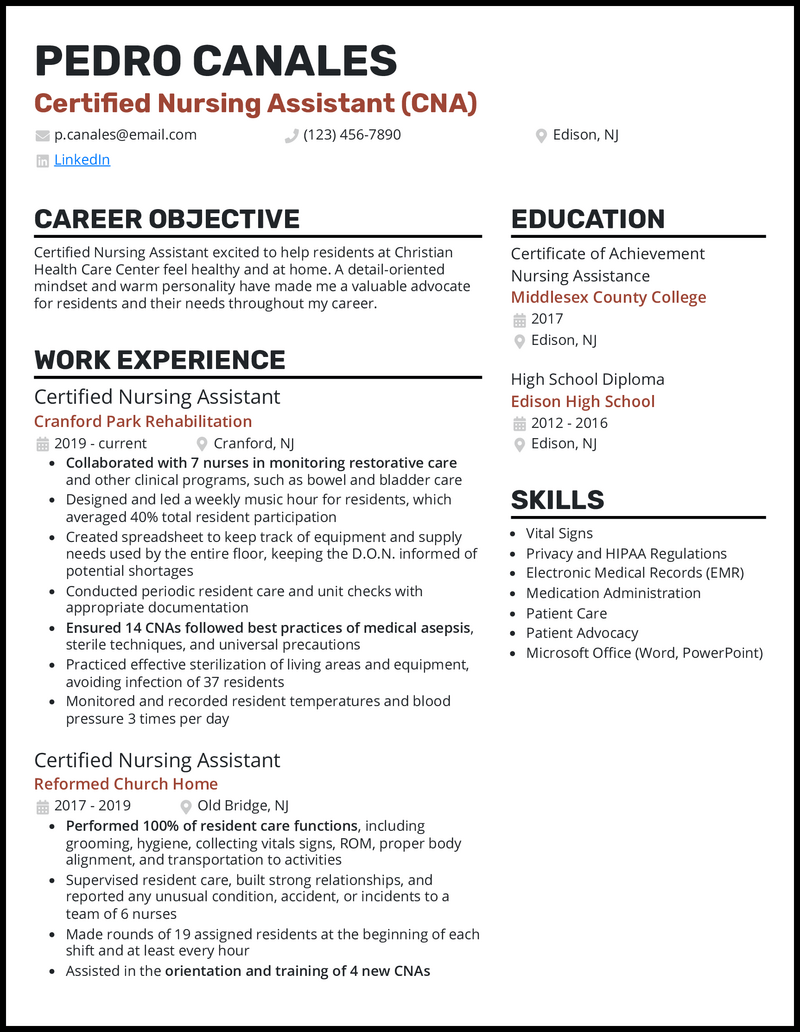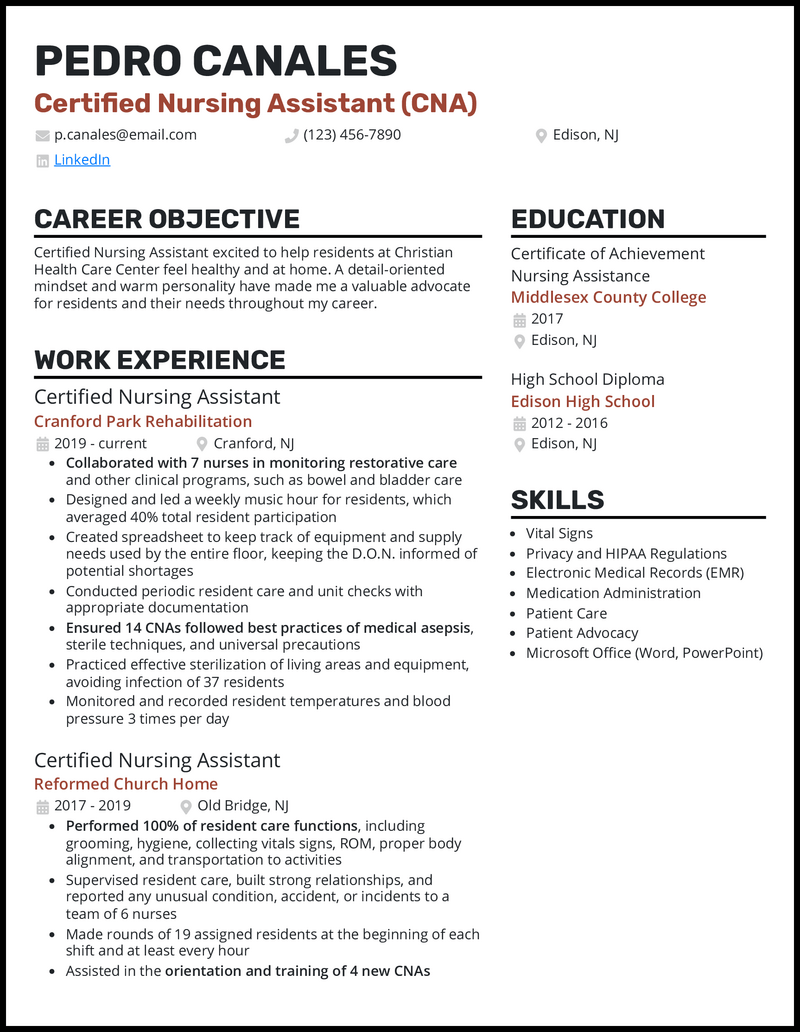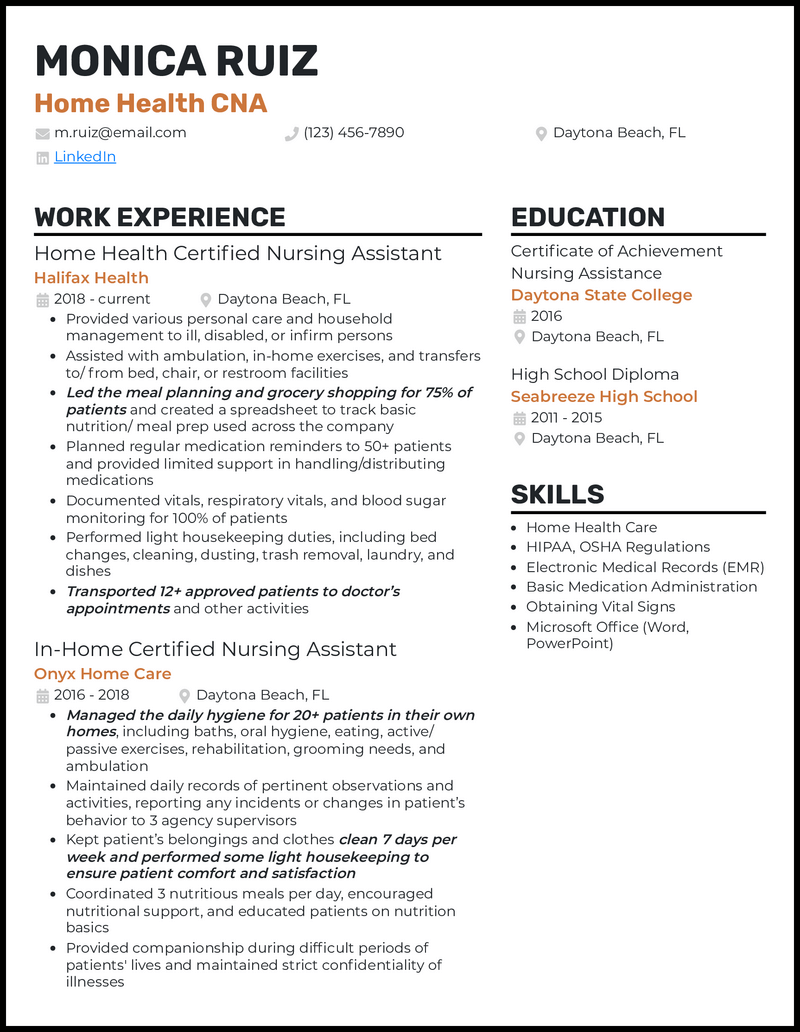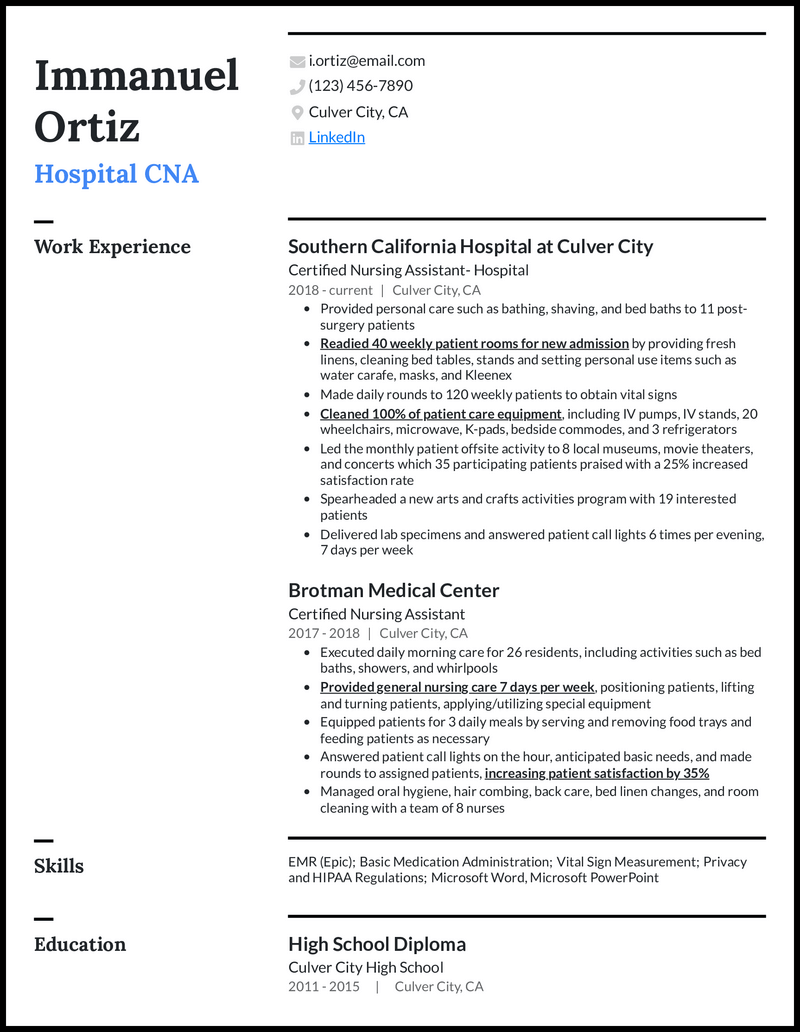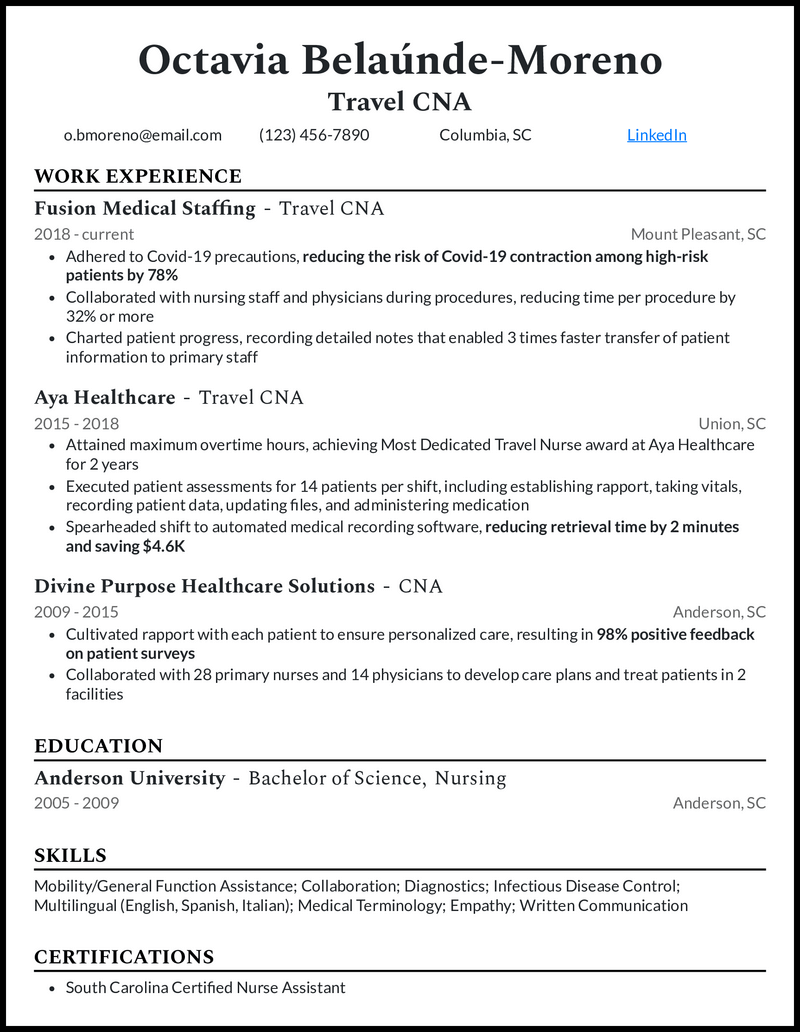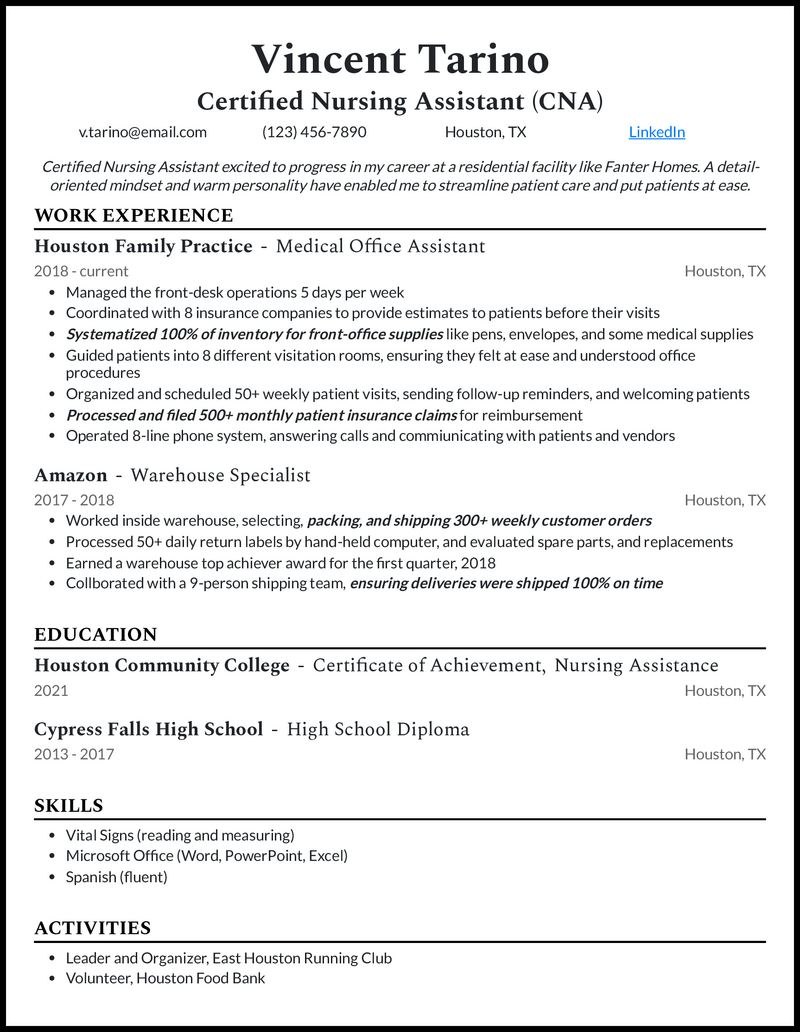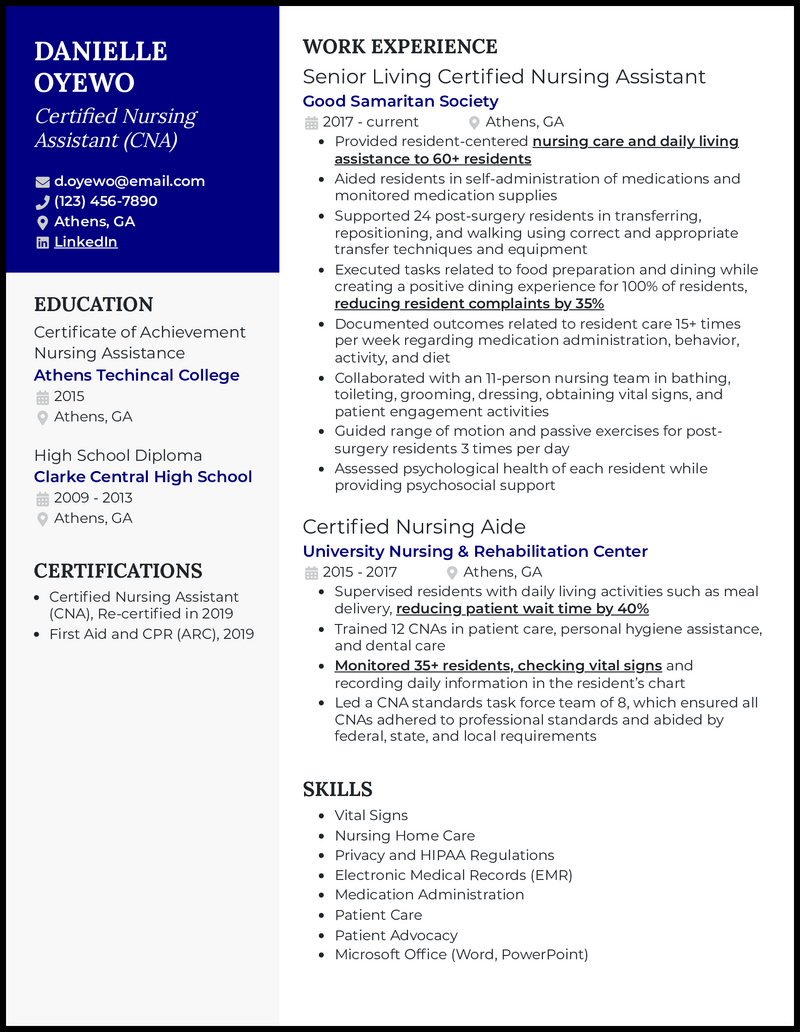
Certified Nursing Assistant





Best for professionals eager to make a mark
Resume Builder
Like this template? Customize this resume and make it your own with the help of our Al-powered suggestions, accent colors, and modern fonts.
A great CNA career starts with knowing how to build a resume that shows not just your skills, but the compassion and dedication behind them.
In this guide, you’ll learn how writing a stunning cover letter can work alongside your resume to win over both hiring managers and applicant tracking systems.
Here’s what’s inside:
- ↪ 13 CNA resume examples that stand out
- ↪ Accomplishments that show real connection with patients and staff
- ↪ How to impress a healthcare employer that shares your values and passion
Why this resume works
- If you include a resume objective on your CNA resume, you must customize it for each job.
- Include the name of the company and the exact role you’re seeking. Then find keywords mentioned in the CNA job description and include a few of those keywords if you can.
Why this resume works
- If writing your work experience bullets on your home health CNA resume drives you to tears, consider this handy resume tip: make each bullet point centering around a particular skill.
See more home health CNA resumes>
Why this resume works
- A single, remarkable stint, highlighted in your nurse aide resume, could be the golden ticket to propel your candidacy to the forefront. Take this chance to spotlight your responsibilities, quantified wins, and tools mastered from the tenure.
- These kinds of career wins make a perfect launching pad for story-telling when it comes time to write a cover letter.
Why this resume works
- When writing skills on your resume, be specific with your keywords but don’t include too many. We’d suggest six to eight skills for your hospital CNA resume.
See more hospital CNA resumes>
Why this resume works
- Putting together a CNA no experience resume will have you feeling like a deer caught in the headlights. What does it take to cut through the noise? An education section that shows you’re at the top of the game could hit the nail on the head.
Why this resume works
- As important as it is to make your work experiences sound compelling, it’s not the only critical section on your travel CNA resume.
- You need a resume summary that clearly demonstrates your aptitude for the job. Also using a resume checker is a great way to ensure your resume is error-free and easy to read.
See more travel CNA resumes>
Why this resume works
- Slip a projects section right after your CNA student resume’s work experience and flaunt relevant details of each role (we’re talking about the project names, your role, and dates completed). The trick to infusing this part with more clout is tailoring it to the role and quantifying your results.
Why this resume works
- The CNA hospital resume is more than a canvas for your job experiences—it’s an excellent avenue to flaunt industry-relevant credentials, showcasing your competency in patient care.
- Be it a general CNA certification or a specialized one like CNA II or Medication Aide Certification, the credential adds a stroke of authority to your candidacy.
Why this resume works
- If your CNA GNA resume can show that you’ve taken the extra step of getting certified to work with the elderly, hiring mangers will recognize that you’re uniquely qualified and dedicated to care for this community.
- Add a certifications section on your resume to draw attention to your geriatric specialization.
Why this resume works
- Start by making sure your beginner CNA resume is as relevant as possible.
- Include whatever work experience you have and focus on transferable skills. If you’re tight on relevant work experience, you can include a hobbies and interests section on your resume.
See more beginner CNA resumes>
Why this resume works
- You can enhance your acute care CNA resume by giving particular attention to ways you’ve successfully monitored and addressed medical emergencies in your past roles.
Why this resume works
- A great LNA resume should clearly demonstrate your compassion and focus on every patient’s wellbeing.
- Don’t shy away from discussing patient satisfaction ratings, how you’ve reduced the risk of patient injury or depression, and how you’ve generally lifted the spirits of patients and colleagues on your floor.
Why this resume works
- When discussing your work experience on your senior CNA resume, include skills like light housekeeping and social event planning to show your versatility.
- Don’t forget to add technical skills like “electronic medical records,” “HIPAA regulations,” and “vital signs.”
Related resume guides
How to Format a Certified Nursing Assistant (CNA) Resume

How you format your resume can determine whether or not you will land the job.
Therefore, it’s crucial your resume is readable, logical, and only a single page long (while also allowing for some white space for readability).
Here’s what this section focuses on:
- Choosing a clean, professional format that’s easy to read
- Creating a clear header with your name and up-to-date contact information
- Using the right keywords to pass ATS screening
- Organizing content so it quickly captures a recruiter’s attention

Reverse-chronological format, functional format, and combination/hybrid format
There are three popular formats for your CNA resume in 2026:
Reverse-chronological format
- This format highlights relevant work experience, starting with your most recent position and working backward.
- You may need to choose a different format if you’re changing careers or have large gaps in your work history.
- Most recruiters prefer this format because it’s easy to skim for pertinent information.
- It’s also the easiest for applicant tracking systems to read, so this format is the industry standard.
Functional format
- This format emphasizes your skills instead of your work experience. In place of work history, list your professional accomplishments and proficiencies first.
- You may choose to omit your employment history or place it near the bottom of your resume.
- Functional formats are ideal for people who are changing careers or who have significant employment history gaps.
- However, many recruiters may not be as familiar with this format, so it’s not easy to pass through applicant tracking systems.
Combination/ hybrid format
- As the name suggests, this format combines both functional and reverse-chronological formats. You can list your skills at the top and then your reverse-chronological work history below it.
- However, your work history is not the main focus and won’t take up much space.
- This format lets you highlight what makes you the best fit for the job while still giving the recruiter what they’re seeking.
- The challenge with the combination/hybrid format is that it’s more difficult to read, and the recruiter may have trouble getting it through the applicant tracking system.

Listing name, city, and how to contact
The header of your CNA resume must contain a few things for identification purposes:
- Your name
- Your name should be at the very top to avoid making the busy recruiter scour for it. You can set it to size 18-22 font in bold, ideally in black.
- City
- You don’t need to include your full address, but we’d recommend including your city and state. No need for anything else!
- Contact details
- Use your most current contact information, including your phone number, email address, and Linkedin profile.
Notice the larger font for the name compared to the job title.


Get through the ATS
Companies widely use applicant tracking systems (ATS) to check applicant qualifications. Therefore, reading the job description carefully and using the exact wording within your resume is advisable. Most ATS systems search for keywords, so avoid using acronyms.
Here are a few ways your CNA resume can pass the ATS:
- Use a clear, easy-to-read resume format
- Overly-playful visuals can make your CNA resume hard to read. Don’t use graphics or unusual fonts.
- Use Calibri, New Times Roman, or Arial fonts in either a 10 or 12 font size for your body font.
- Your margins should also be one inch around all the way.
- Arrange your resume contents in a logical order so that the ATS can find important information easily.
- Use simple headers
- The ATS scans for specific words, so you need to use industry-standard headers.
- Choose relevant keywords
- Your choice of words is key to the ATS accepting your resumes. Use words mentioned in the job description or industry-specific terminologies, such as “patient care,” or “clinical research.”
How to write a Certified Nursing Assistant Resume

A standout CNA resume shows how you provide exceptional care, build trust with patients, and work seamlessly with your team.
Summary
Elevate your CNA resume with patient-centered accomplishments, clinical skills, and compassionate care that make your application unforgettable.
To nail the job, bring forward the skills, results, and compassion that make you an asset to any healthcare organization.
We’ll focus on how to:
- Share measurable wins in patient care and support
- List certifications, licenses, and any specialized training
- Prove your communication and teamwork strengths
- Give examples of solving problems in high-pressure situations
- Connect your experience to the employer’s mission and values

When do you need to include a resume objective or summary?
Adding a resume objective or a resume summary is a way to catch a recruiter’s attention and stand out from other applicants. But what exactly are these optional sections, and how do you use them?
A resume objective is a two-to-three-sentence statement highlighting significant aspects of your character, career goals, and skills. Having a compelling objective makes it easier for the hiring manager to glimpse who you are and your role-related strengths.
A resume summary is a two-to-three-sentence statement showcasing your most relevant accomplishments throughout your career. A good resume summary should include metrics relating to your successes and any specializations you have that could prove valuable to the organization.
Resume objectives can be useful if…
- If you’re considering a career change
- If you’re seeking an entry-level position
- If you’ve recently switched locations/areas of residence
- If you’re willing to tailor it to each job for which you apply
- This is the most important!
In contrast, writing a vague objective statement can work against you.
- Vague objective example: I am a recent graduate with a passion for the job that you’re offering. It would be my sincere pleasure to work for you.
- This objective defines generic. It lacks any customization for a certain job and is also missing any skills or specific information.
Appeal to potential employers by including detailed qualifications.
- Example: Compassionate CNA nurse with 10+ years of experience working in three major hospitals. Having graduated from John Hopkins School of Nursing, I look forward to using my excellent communication, expertise, and empathy with all John Muir patients.
- Example: As a member of the nursing community with six years of experience, I’m eager to collaborate with Kaiser Permanente in helping patients recover and victims heal.
Generally, keeping your resume objective/summary statements concise is best.
A well-crafted summary can be a useful tool in your CNA resume
A poor summary:
- I am a nurse looking for work. I can help your institution grow into a highly-esteemed medical center.
Such a summary statement is vague and fails to illustrate your strengths, lengthy work experience, or why you desire to work for the target business.
Compare the previous yawn-worthy summary with the following on-point examples:
- Three-time award-winning nurse specializing in childcare and emergency services. Highly computer savvy, I’m looking to hone my 12 years of expertise with San Francisco General Hospital.
- Dedicated registered nurse looking to advance my 11-year labor and delivery career by joining a caring, patient-centered organization like Sutter Hospital.

Lead with your work experience
Your CNA resume should also always include a work experience section so employers can determine your abilities and qualifications.
How to write strong work experience bullet points
Before your write your work experience bullet points, take the time to research the work culture and other vital information. Learn about any relevant skills and future responsibilities your employer expects, and try to include some of that information on your resume.
To write a good work experience section, include any skills you cultivated, relevant accomplishments, and awards. We’d recommend only including three to four bullet points per work experience (unless you only have two past jobs on your CNA resume, in which case you should have four to five bullet points per job).
On a more detailed note, you should use active voice with consistent verb tenses and punctuation. Also avoid using personal pronouns.
Examples of poor work experience bullets include:
- Took care of patient needs
- Assessed patient conditions
- Assisted co-workers with additional services
Poor job description bullet points reduce your chances of securing employment. Employers can’t get a solid idea of your skills and can’t quantify your performance, which doesn’t bode well for your chances of getting an interview.
Compare the previous job description bullets with the following improvements:
- Assessed needs and implemented appropriate care, providing 17 daily terminal patients with bathing, fresh linens, making their beds, and engaging in conversation to help them live out fulfilling lives
- Assisted 6 doctors and 4 nurses, ensuring they were well-equipped with fresh, sterilized supplies and informed of individual patient progress more than 8 times per day
- Represented the care center’s ideals, morals, and commitment to quality for 20 patients daily
Tailoring bullet points to the job description remains an invaluable tool for young entrants and experienced professionals. The last three job description bullets highlight why some applicants would succeed over others. The latter offers a detailed description of a CNA’s duties, gives tangible metrics, and implies what management can expect from them.
Add numbers to show your impact
Numbers can have a significant effect on your resume’s appearance and readability. Metrics make your resume easier to read by providing word breaks, making it more appealing to potential employers.
Include at least three to four numbers or statistics in your resume for a more professional touch. You can also use numbers to show data and improve credibility.
Here are some ideas for incorporating numbers within your resume:
- Patient numbers: you can mention the specific number of patients you’ve served.
- For instance: Attended 16 daily patients, 85% of whom had undergone a successful surgery
- Revenue: consider discussing revenue increases from your department during your duration.
- For instance: Impacted team morale and productivity, resulting in a 25% increase in revenue, complemented by a 97% improvement in patient satisfaction ratings
- Time: use metrics to detail the specific duration of your professional engagements.
- For instance: Built skills as a CNA specialist for 15 years, enhancing the workplace for a team of 11 other nurses and 60+ monthly patients

The best CNA skills to include
As a CNA, you need a combination of soft and hard skills on your resume.
Soft skills relate to the interpersonal aspects of your job, such as communication, leadership, and empathy. In contrast, hard skills focus on the technical aspects of your job, such as knowledge of HIPAA regulations, EMR, and obtaining vital signs.
Include a blend of hard and soft skills to show your qualifications and personality traits.
Examples of skills you can include on your CNA resume
- Communication
- Empathy
- Time management
- Teamwork
- Microsoft Outlook, PowerPoint
- Knowledge of OSHA
- Medication administration
Don’t forget to research job ad keywords to determine and include potential skills that qualify you with the recruiter and the ATS.

Education, awards, and certificates
Certifications are a definite means of ensuring credibility. Always include your relevant educational certificates in your CNA resume to show your potential employer that you have the necessary qualifications for the position.
Remember to include your CNA certificate, graduate/diploma certificates, and additional certifications from specialized courses that you may have undertaken.
Build confidence in potential employers by listing your certs!


Adding projects, interests, hobbies, and activities
Adding hobbies, interests, and projects helps employers understand your traits and measure how you’ll fit into the organization’s working environment. Projects are not particularly important for experienced professionals but can be valuable for entry-level applicants.
Examples of hobbies and interests to include on your resume include:
- Led weekly CPR training club for local high school students
- College basketball team captain
Examples of projects include:
- Developed 6-month memory loss study and solutions for 12 aging volunteer patients
- Designed patient-centric care ideas by interviewing and assessing 18 volunteer patients who had undergone recent surgeries and short-term care through local hospitals
Remember to research the job descriptions for keywords that could help align your hobbies/interests and projects with those of your potential employer.

Customizing your resume for each job
If there’s one resume tip we hope you use, it’s tailoring your certified nursing assistant resume for each job application. Customizing your AI resume to each job shows the hiring manager that you cared enough to research the position and sincerely desire to work with their company.
Do someone online research to learn about the workplace culture and expectations. Then you can use that information to write an enticing resume with adjusted objectives/summaries, work experience bullet points, and skills to suit what recruiters want.
Notice how you can customize your objective to the target business.


Double-check for any errors
Spelling mistakes, formatting errors, and structural issues can negatively impact the quality and desirability of your CNA resume. Therefore, it’s crucial to fix your resume before uploading or sharing your resume with recruitment agencies.

Secure That Position!
Congratulations! You’re now ready to share your certified nursing assistant resume with the world. Consider the essential aspects to include in your resume while making it as brief but detailed as you possibly can.
Key takeaways:
- Pick a suitable format
- Include your name, city, and contact information
- Outsmart the ATS (applicant tracking system) by making your resume easy to read with relevant keywords
- Know when to use objectives/summaries
- Keep your work experience tailored toward the job description
- Include hard and soft CNA skills
- List education certifications and relevant hobbies/interests when appropriate
- Customize your resume for each job to which you apply
- Check your resume for errors before you submit it
Now that you’ve got these resume tips, don’t forget to use the best AI resume builder to create a stunning CNA resume with the help of our AI-powered tips.
After everything checks out, share your CNA resume proudly with hiring managers and ready yourself for the next exciting step in your career!
Certified Nursing Assistant (CNA) Resume FAQs

On a CNA resume, you demonstrate your hands-on experience in providing basic patient care such as bathing, feeding, grooming, mobility support, and monitoring vital signs.
You should highlight collaboration with nurses and healthcare teams and your ability to maintain a safe, dignified environment for patients. Use bullet points with action verbs and skills, and quantify your achievements when possible.
The skills section lists the clinical and interpersonal strengths that make you a capable caregiver. It should be concise and tailored to the job posting, often appearing as a bulleted list. Include hard and soft skills to present yourself as a complete professional ready for the work ahead.
To be a successful CNA, you need a blend of clinical competencies and emotional intelligence, which include:
✅Patient care and hygiene
✅Infection control procedures
✅Mobility assistance and fall prevention
✅CPR and basic life support (BLS)
✅Empathy and compassion
✅Strong communication
✅Team collaboration
✅Attention to detail
✅Stress management in high-pressure environments




